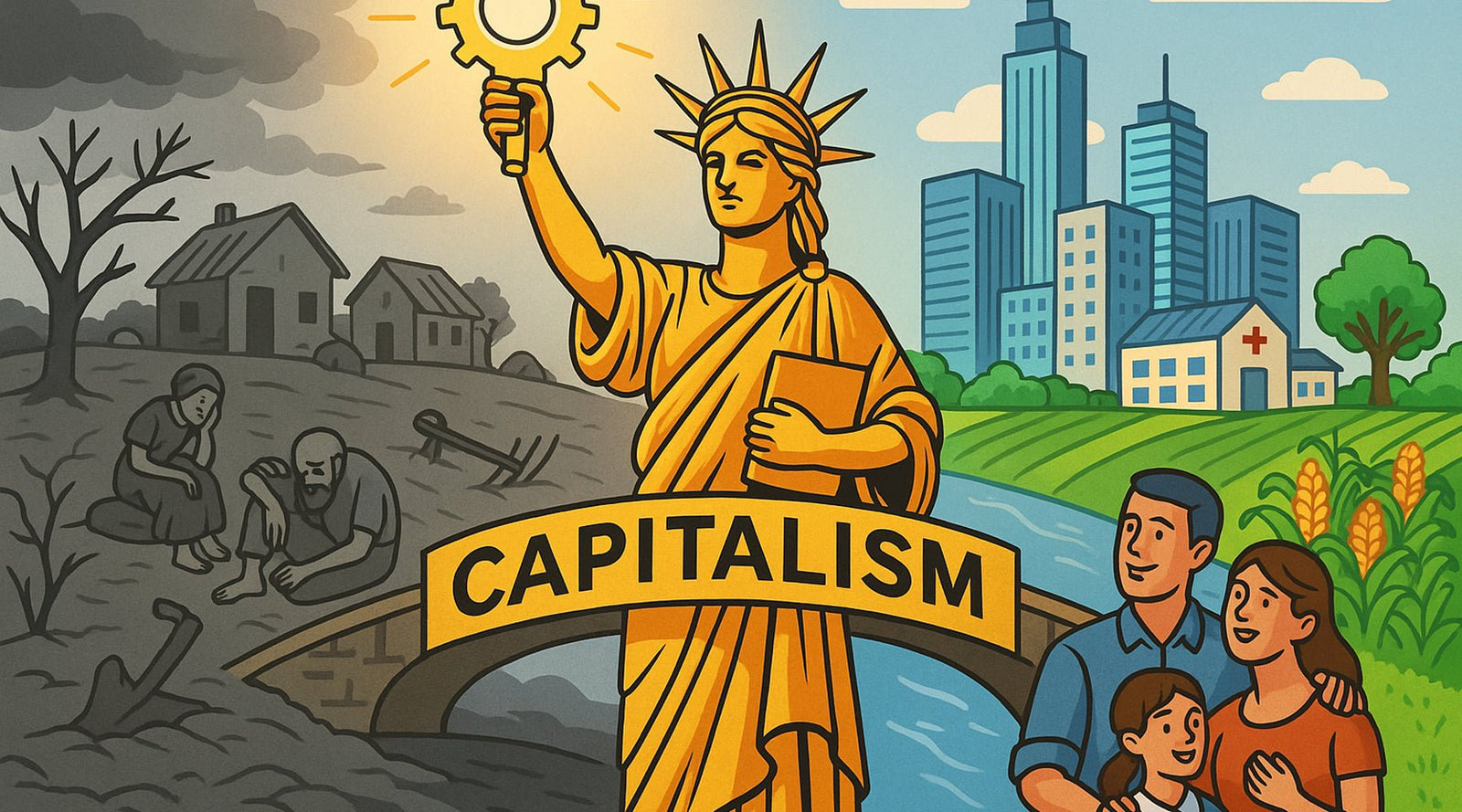Capitalism is constantly under attack. Critics claim it causes inequality, exploitation, and needless suffering. They cite statistics about poverty, disease, and hunger and argue that markets and profits are to blame. But history tells a very different story.
Far from being the cause of human misery, capitalism has been the single greatest engine of human progress ever devised. It has lifted billions out of poverty, doubled life expectancy, and created a world of opportunity that our ancestors could only dream of.
Poverty: Humanity’s Starting Point, Not Capitalism’s Invention
For most of human history, extreme poverty wasn’t an exception — it was the norm. In 1820, over 90% of the world’s population lived on the modern equivalent of less than $2 per day. Starvation, disease, and early death were part of daily life.
What changed? Not charity. Not utopian central planning. The breakthrough was the rise of capitalism: private property, free trade, and voluntary exchange. The Industrial Revolution unleashed productivity, innovation, and wealth creation on a scale the world had never seen. Today, fewer than 10% of people worldwide live in extreme poverty. That’s the fastest and largest improvement in human well-being in all of history.
Life Expectancy: Doubling in the Age of Capitalism
In the early 1800s, average global life expectancy hovered around 30 years. Disease, malnutrition, and lack of medicine cut human lives tragically short.
Now? Thanks to capitalist innovation, global life expectancy is over 72 years — more than double. Modern medicine, antibiotics, vaccines, sanitation systems, and agricultural abundance are all fruits of markets and incentives. People who once lived in constant fear of famine and plague now routinely live long enough to see their grandchildren grow up.
This isn’t luck. It’s the result of millions of entrepreneurs, scientists, and innovators having the freedom and incentive to solve problems.
Innovation and Prosperity
Capitalism doesn’t just make us richer — it makes us smarter, healthier, and more connected. Consider:
-
Agriculture: Capitalist investment and research produced the Green Revolution, which fed billions and prevented mass starvation.
-
Medicine: Pharmaceutical breakthroughs from profit-driven companies have eradicated diseases, extended lives, and turned once-deadly conditions into manageable ones.
-
Technology: The global communications revolution — from smartphones to the internet — emerged not from central planning, but from free enterprise.
Every time we flip a light switch, drink safe water, or take a cheap flight across continents, we are enjoying the fruits of capitalism.
Capitalism vs. Collectivism: A Tale of Two Systems
When people blame capitalism for poverty, they forget that poverty is humanity’s default condition. The real question is: which system has reduced poverty the most?
The answer is clear. Wherever markets have been allowed to function, prosperity has flourished. South Korea and Taiwan embraced capitalism after World War II and went from destitution to prosperity within a generation. Meanwhile, North Korea, Cuba, and Venezuela embraced socialism and remain trapped in shortages, repression, and misery.
Even in socialist states, survival often depends on importing capitalist goods — from food to medicine to technology. That fact alone tells the truth: socialism consumes wealth, capitalism creates it.
The Morality of Voluntary Exchange
Capitalism’s critics like to paint it as cruel, reducing people to wage slaves and profit-chasers. But in reality, capitalism is the only system based on voluntary exchange. No one is forced to buy, sell, or work where they don’t want to. People contract, compete, and innovate because it benefits them. The result is mutual gain.
Contrast this with collectivist systems, which impose outcomes by force. When the state decides who gets what, the individual loses freedom. Under capitalism, you may not get everything you want — but what you earn, trade for, or create is yours. That is justice.
Beyond Wealth: The Cultural Benefits of Capitalism
Capitalism doesn’t just provide material abundance. It fuels cultural and social progress, too. Wealthier societies can afford art, music, literature, and education. They can support charities, fund research, and care for the vulnerable.
In short, capitalism doesn’t just enrich wallets — it enriches human life.
Why Libertarians Advocate Capitalism
Libertarians don’t defend capitalism because we think it’s flawless or because we worship profit. We defend it because it is the only system consistent with individual liberty and voluntary exchange.
-
Self-Ownership and Property Rights
-
Capitalism rests on the idea that you own yourself and, therefore, the fruits of your labor.
-
You are free to create, trade, and build without waiting for permission from a bureaucrat or ruler.
-
-
Voluntary Exchange Over Coercion
-
Every capitalist transaction is based on consent. Both parties agree because they believe they will benefit.
-
Contrast this with collectivist systems, where outcomes are imposed by the state, regardless of individual choice.
-
-
Decentralized Power
-
Capitalism disperses power across millions of buyers and sellers. No single authority decides what gets made or who gets it.
-
Socialism centralizes power in the hands of planners and politicians, which historically has led to abuse, shortages, and even mass death.
-
-
Human Flourishing
-
By rewarding innovation, efficiency, and creativity, capitalism raises living standards for everyone.
-
Libertarians believe prosperity should come not from government handouts or coercion, but from the free and peaceful interaction of individuals.
-
At its heart, libertarians advocate capitalism not just because it “works,” but because it is just. It respects human dignity, choice, and freedom. The fact that it also happens to have lifted billions from poverty and doubled life expectancy is the strongest proof imaginable that liberty and prosperity go hand in hand.
Conclusion: The Truth About Capitalism
When critics point to poverty and disease as the “cost” of capitalism, they are missing the forest for the trees. Poverty and disease are the baseline conditions of humanity. Capitalism is what disrupted that cycle. It lifted billions out of misery, doubled life expectancy, and gave us the most prosperous and free era in history.
The question isn’t whether capitalism is perfect. It’s whether there’s any system in history that has done more for human flourishing. The answer is obvious: capitalism has been the greatest force for good the world has ever seen.



